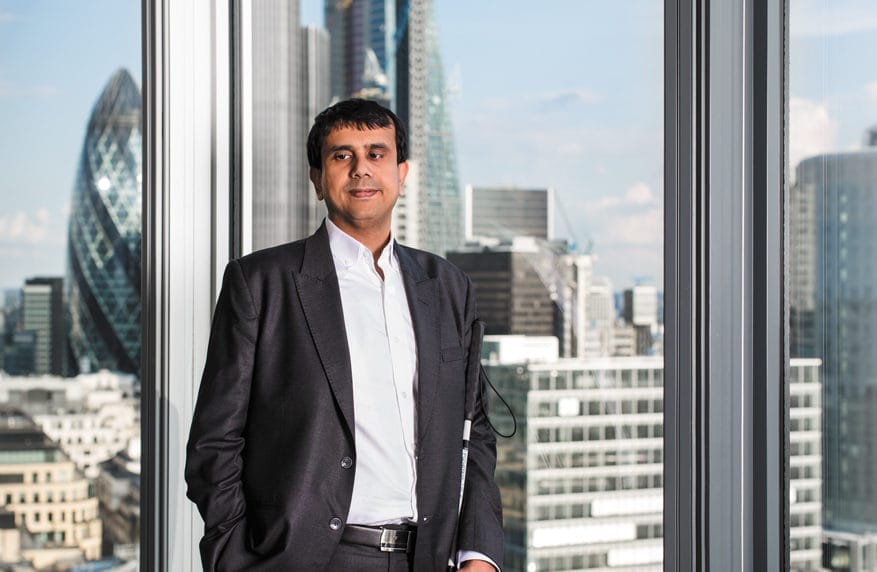The Pioneer: Ashish Goyal WG08

Goyal in the Citadel offices in London. (Photo: Richard Boll)
Last August, Ashish Goyal, 37, left his job with the hedge fund BlueCrest Capital Management for a new role as a London-based portfolio manager on the global fixed income team at Citadel, one of the oldest hedge fund firms. It was a relatively easy transition for a guy who couldn’t land an interview while he was still in school. “When I was applying for jobs,” Goyal says, “I’d be short-listed on the basis of my résumé. But when they found out I was blind, that was the end.”
There had never been a blind Wall Street trader before Goyal. For that matter, there had never been a blind Wharton graduate. But by the time he’d finished (second in his class) at SVKM’s NMIMS in Mumbai, then worked for several years as a fixed income trader at ING Vysya Bank in Bangalore, Goyal knew he wanted to be at the center of the global market. That meant studying at Wharton, whatever it took.
“I did not know if I would be successful,” admits Goyal, who lost his eyesight gradually to retinitis pigmentosa between the ages of nine and 22 and is now completely blind. “But I was determined to try.” He made it through his classes with the help of the same screen-reading software he now uses on the job. When his efforts to land an internship foundered, he briefly considered a career change to consulting: “But then I woke up and said, ‘I didn’t come all the way here to do that.’”
He just needed one bank to take a chance on him. Finally, JP Morgan did. “That’s all I was looking for,” Goyal explains. “For someone who was willing to take a risk.” Well, that and trust. “As you can imagine, there are so many simple things I can’t do, and I have to depend on others—to cross the road, to find a shop. I have to ask for help.” And that, he says, leads to trusting other people, which in turn is empowering for them.
What people with disabilities like his need, he says, is open-mindedness and opportunities to prove themselves. “It doesn’t have to be a sympathetic relationship,” he explains. “There’s not one giver and one taker. Change comes when people work with each other to explore what’s possible—to stretch the boundaries and create a level playing field. Then merit and ability take care of the rest.”
On such a field, Goyal has been able to prove his worth. In 2010, the president of India presented him with that nation’s National Award for the Empowerment of People With Disabilities. In 2015, the World Economic Forum named him a Young Global Leader, a position that’s enabled him to meet “some really awesome people.” He mentors young people “of all sorts, disabled and not.” He’s flown a plane, learned to play musical instruments, and become a runner (“Before my knees gave out”). And speaking of fields, he played on a blind cricket team that took the U.K. national championship.
Goyal knows technology smoothed the way for his success in business: “When I talk to trade groups, I always say: I’m lucky I was born in 1980, not in 1960.” But tech has nothing to do with his indomitable spirit. “Life is full of opportunities,” he says. “Grab them with both hands.”—Sandy Hingston





















